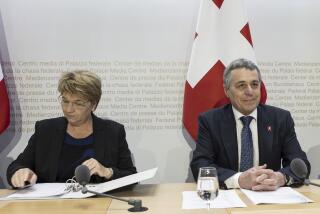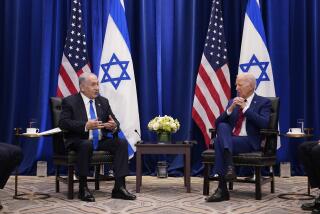Soviets Agree to Allow Visit by Israeli Envoys
MOSCOW — The Soviet Union has agreed to allow Israeli diplomats to visit Moscow, the first such delegation permitted in more than 20 years.
Foreign Ministry spokesman Gennady I. Gerasimov said Tuesday that the Israelis will review the work of Dutch diplomats who have been looking after Israeli interests in Moscow. No date has been set for the visit, which Gerasimov said was agreed to during the course of discussions last week in Helsinki.
There have been no Israeli diplomats in Moscow since 1967, when the Soviet Union severed relations with the Jewish state after the Six-Day War.
However, Gerasimov said Tuesday’s announcement does not signify any change in the Soviet attitude on restoring diplomatic ties. Moscow has taken the position that it will not restore diplomatic relations with Israel until there is a Middle East peace settlement.
Gerasimov also said the forthcoming visit is not connected with the presence of the Soviet consular delegation that has been in Israel since last July. That delegation was sent to provide services for Soviet citizens who live in Israel and to look into the status of Soviet property in Israel.
Israel then sought a reciprocal visit, but Moscow rejected the idea, contending that there are no Israeli citizens in the Soviet Union and no Israeli property.
In Jerusalem, a spokesman for Prime Minister Yitzhak Shamir welcomed word of the Helsinki agreement, although he emphasized that Israel is still not satisfied with the rate of Soviet Jewish emigration and that it still wants full diplomatic relations restored.
Sources in Jerusalem who asked not to be identified said that a delegation of four to five Israeli diplomats is expected to leave for Moscow sometime next month.
Present for the talks in Helsinki, according to Israeli officials in Jerusalem, were Nimrod Novik, chief political adviser to Foreign Minister Shimon Peres, and the deputy head of the Soviet Foreign Ministry’s Mideast department. Topics said to have been discussed included emigration of Soviet Jews and attempts to further the Middle East peace process.
Until Tuesday, there had been no public announcement of the meeting in Helsinki, apparently to discourage media attention.
Soviet-Israeli diplomacy has taken a lower profile since envoys from the two countries first met in Helsinki in August, 1986. That meeting broke up 90 minutes after it started, with no agreement on anything, after the Israelis tried to put the issue of Jewish emigration on the agenda.
Israeli sources regarded it as particularly interesting that the Soviets chose to make Tuesday’s announcement at a time when Israel is under fire in the United States and elsewhere for its handling of unrest in the occupied territories.
One possible reason for this, it was suggested, is that Moscow may believe that the chances of convening an international Middle East peace conference are better than generally considered, and that it fears that unless it takes steps to improve its relations with Israel, it could be be isolated in this process.
Eaton reported from Moscow and Fisher from Jerusalem.
More to Read
Sign up for Essential California
The most important California stories and recommendations in your inbox every morning.
You may occasionally receive promotional content from the Los Angeles Times.










